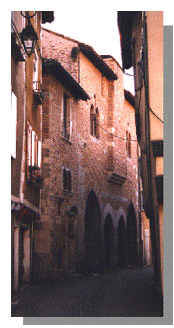

 |
The Chantrerie is not only a museum doubling as a cultural space, it
is also one of the main historical monuments in Cahors. It has been restored and enhanced
to improve our local heritage. The historical information links the Chantrerie with the oldest traditions of Cahors wine making. Amongst the buildings belonging to the cathedral, such as the chapel, the barrel store or the press, the Chantrerie has been with us since the 17th century at least, as seen on the oldest town plans.Up until the French Revolution of 1789, a tenth of the grape harvest was paid to the church, wine was paid to local landowners, put into barrels and the price negociated. In fact, because of it's proximity to the old residential quarters of the town formerly assigned to the Cantor ( le Chantre ) of the Cathedral that the building became to be known as The Chantrerie. |
| When the building is studied it appears complex. Most of
it dates back to the 14th century as confirmed by tests carried out on timbers. The
sloping lower room, lit by two huge windows, opens on to the street by two gateways. Two
arcades equipped with latrines and several cupboards set into the walls, suggest a
warehouse and place of negotiation aswell as a simple wine cellar. |
|
|
This idea transports us back to the Middle Ages where the wine and
silver commerce made the strict, church going bourgeoisie rich, aswell as the most
aggressive international business men and bankers in the Western world. The vast upper room divided by a line of columns, like the staircase that leads to it, dates from changes made in the 17th century. The five medieval fireplaces, along with the latrines, sinks and numerous windows, show that this area was originally divided in to several rooms. Canons' cells? Merchants' lodgings? The use of this area remains a secret, leaving plenty of room for different theories. |
Home Page
The museum visit The wine growersCopyright 1998 - Contact Webmaster